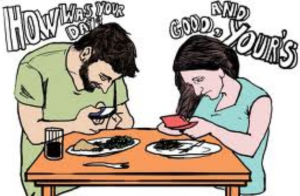Can texting from a cell phone become addictive? Should it be treated like other addictive narcotics or stimulants? I know that sounds a bit crazy, but doctors and psychologists are now answering the question and their answers my surprise you.Do you ever feel like you are addicted to WhatsApp, Facebook, messenger, email, twitter or texting? Do you find it impossible to ignore your email if you see that there are messages in your inbox? Do you think that if you could ignore your incoming email or messages you might actually be able to get something done at work? You are right!
The culprit is dopamine — Dopamine was “discovered” in 1958 by Arvid Carlsson and Nils-Ake Hillarp at the National Heart Institute of Sweden. Dopamine is created in various parts of the brain and is critical in all sorts of brain functions, including thinking, moving, sleeping, mood, attention, motivation, seeking and reward.
Pleasure vs. seeking — You may have heard that dopamine controls the “pleasure” systems of the brain: that dopamine makes you feel enjoyment, pleasure, and therefore motivates you to seek out certain behaviors, such as food, sex, and drugs. Recent research is changing this view. Instead of dopamine causing you to experience pleasure, the latest research shows that dopamine causes seeking behavior. Dopamine causes you to want, desire, seek out, and search. It increases your general level of arousal and your goal-directed behavior. From an evolutionary stand-point this is critical. The dopamine seeking system keeps you motivated to move through your world, learn, and survive. It’s not just about physical needs such as food, or sex, but also about abstract concepts. Dopamine makes you curious about ideas and fuels your searching for information. Research shows that it is the opioid system (separate from dopamine) that makes us feel pleasure.
 Wanting vs. liking — According to researcher Kent Berridge, these two systems, the “wanting” (dopamine) and the “liking” (opioid) are complementary. The wanting system propels you to action and the liking system makes you feel satisfied and therefore pause your seeking. If your seeking isn’t turned off at least for a little while, then you start to run in an endless loop. The dopamine system is stronger than the opioid system. You tend to seek more than you are satisfied. Evolution again — seeking is more likely to keep you alive than sitting around in a satisfied stupor.
Wanting vs. liking — According to researcher Kent Berridge, these two systems, the “wanting” (dopamine) and the “liking” (opioid) are complementary. The wanting system propels you to action and the liking system makes you feel satisfied and therefore pause your seeking. If your seeking isn’t turned off at least for a little while, then you start to run in an endless loop. The dopamine system is stronger than the opioid system. You tend to seek more than you are satisfied. Evolution again — seeking is more likely to keep you alive than sitting around in a satisfied stupor.
Dopamine loops — With the internet, twitter, and texting you now have almost instant gratification of your desire to seek. Want to talk to someone right away? Send a text and they respond in a few seconds. Want to look up some information? Just type your request into google. Want to see what your colleagues are up to? Go to Linked In. It’s easy to get in a dopamine induced loop. Dopamine starts you seeking, then you get rewarded for the seeking which makes you seek more. It becomes harder and harder to stop looking at email, stop texting, or stop checking your cell phone to see if you have a message or a new text…it like food these days.
Teenagers are becoming addicted to texting, there is no doubt! In fact, experts are saying being hooked on texting can be like being addicted to drugs. Regardless of where they are; teenagers and to some extent adults too, seem to need to text.
The average teen sends 2,000 texts a month (according to a small survey I conducted). One student even admitted it: “I think that it’s just like a drug, once you get hooked on to it, you can’t let go. It’s like whenever I open my eyes the first thing I look at is my phone.” “It clearly fits the criteria of an addiction.
What are the warning signs? Look for these symptoms of text overdose:
– Neglecting eating or sleeping
– Losing track of time due to the cell phone
– Ignoring others or lying to them due to text messages
– Depression from not getting enough texts from friends
The cost of this kind of addiction can be measurable. I’ve been talking about brain research for a while now. Experts say teenage brains are still developing, and haven’t fully developed in the area that processes consequences and regulates impulses, which can be a problem especially while driving and texting. If adults fail to provide incentives for healthy adolescent behavior — teens may not have it in them to regulate themselves. May I suggest a few simple ideas?
1. Talk with them and mutually decide boundaries for cell phone use.
2. Balance phone calls with texting.
3. Don’t let yourselves to get socially lazy.
4. As a norm, don’t sleep with your cell phone on. Be OK with turning it off.
4. Texts are for information not emotion. If information elicits emotion — don’t use a text.
More, more, more — Interestingly brain scan research shows that the brain has more activity when people are ANTICIPATING a reward than getting one. Research on rats shows that if you destroy dopamine neurons, rats can walk, chew, and swallow, but will starve to death even when food is right next to them. They have lost the anticipation and desire to go get the food. Although wanting and liking are related, research also shows that the dopamine system doesn’t have satiety built in. It is possible for the dopamine system to keep saying “more more more”, causing you to keep seeking even when you have found the information. How many times have you searched for something on google, found the answer, and yet realize a half hour later that you are still online looking for more information?
140-160 characters is even more addictive — And the dopamine system is most powerfully stimulated when the information coming in is small so that it doesn’t full satisfy. A short text or twitter (can only be 140-160 characters!) is ideally suited to send your dopamine system raging.
Turn off the cues — One of the most important things you can do to prevent or stop a dopamine loop, and be more productive is to turn off the cues. Adjust the settings on your cell phone and on your laptop, desktop or tablet so that you don’t receive the automatic notifications. Automatic notifications are touted as wonderful features of hardware, software, and apps. But they are actually causing you to be like a rat in a cage. If you want to get work done you need to turn off as many auditory and visual cues as possible. It’s the best way to prevent and break the dopamine loops.
What do you think? How do you deal with dopamine loops? Are you willing to turn off your cues?




.png)









